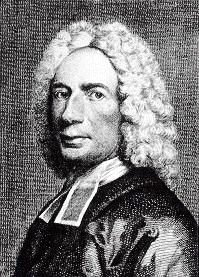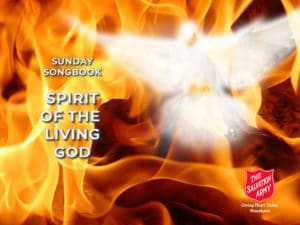I sing the mighty power of God,
That made the mountains rise,
That spread the flowing seas abroad,
And built the lofty skies.
I sing the wisdom that ordained
The sun to rule the day;
The moon shines full at His command,
And all the stars obey.
I sing the goodness of the Lord,
Who filled the earth with food,
Who formed the creatures with His word,
And then pronounced them good.
Lord, how Thy wonders are displayed,
Where’er I turn my eye,
If I survey the ground I tread,
Or gaze upon the sky!
There’s not a plant or flower below,
But makes Thy glories known,
And clouds arise, and tempests blow,
By order from Thy throne;
While all that borrows life from Thee
Is ever in Thy care;
And everywhere that we can be,
Thou, God, art present there.
 Although this hymn is not typical of children’s hymns of today, Isaac Watts did write it for children. Born in England in 1674, Isaac, at age twenty, complained to his father about the Psalms used in their church, and his father challenged him to write something better. Isaac proceeded to do so over many years, during some of which time he was a pastor. His songs were not well-received by some people, who still favoured singing only traditional Psalms. Some churches “split” over the issue, including one in Bedford, once pastored by author John Bunyan. In May 1789 in the United States, Reverend Adam Rankin rode horseback from Kentucky to Philadelphia, Pennsylvania, to ask the Presbyterian General Assembly to “refuse the great and pernicious error of adopting the use of Isaac Watts’ hymns in public worship, in preference to the Psalms of David”.
Although this hymn is not typical of children’s hymns of today, Isaac Watts did write it for children. Born in England in 1674, Isaac, at age twenty, complained to his father about the Psalms used in their church, and his father challenged him to write something better. Isaac proceeded to do so over many years, during some of which time he was a pastor. His songs were not well-received by some people, who still favoured singing only traditional Psalms. Some churches “split” over the issue, including one in Bedford, once pastored by author John Bunyan. In May 1789 in the United States, Reverend Adam Rankin rode horseback from Kentucky to Philadelphia, Pennsylvania, to ask the Presbyterian General Assembly to “refuse the great and pernicious error of adopting the use of Isaac Watts’ hymns in public worship, in preference to the Psalms of David”.
As we well know, the hymns of Isaac Watts became widely accepted and beloved. The one above was published in 1715 in his collection, Divine and Moral Songs for Children . Watts said he wanted children, whether of the Church of England or Dissenters, to be able to join in singing hymns they could understand.
WORDS: ISAAC WATTS; MUSIC: CONRAD KOCHER (TUNE, ELLACOMBE)
S.A. SONG BOOK, 2015 EDITION, #36
REFERENCE: MORGAN, ROBERT J., THEN SINGS MY SOUL








